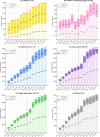Health equity and system resilience during crises - ensuring healthcare for refugees based on lessons from Iran's response to the 2021 Afghan migration
- PMID: 40598462
- PMCID: PMC12218945
- DOI: 10.1186/s12939-025-02564-6
Health equity and system resilience during crises - ensuring healthcare for refugees based on lessons from Iran's response to the 2021 Afghan migration
Abstract
Background: Sudden influxes of displaced populations can strain health systems, especially in low- and middle-income countries. Iran hosts one of the world's largest migrant and refugee populations -predominantly from Afghanistan - and provides inclusive access to public health and education services. In August 2021, the crisis in Afghanistan triggered a sharp increase in Afghan arrivals to Iran, raising healthcare demand amid the COVID-19 pandemic. This study examines how one of the largest public health networks in Tehran responded to this surge and the resulting impact on equitable service coverage and system resilience.
Methods: We retrospectively analyzed monthly healthcare utilization data over a 13-month period (February 2021-February 2022) from the largest public health network in western Tehran, which serves approximately 5.5 million residents, including nearly 1 million migrants and refugees. Patients were categorized into six demographic subgroups: children, women of childbearing age, adolescents, young adults, middle-aged adults, and the elderly. Changes in the number and proportion of patients receiving the full Essential Health Service Package (EHSP) were assessed using six-month pre-/post-event comparisons, with statistical significance determined via chi-square tests (p < 0.05).
Results: The total number of patients served increased eight-fold, from 88,091 in February 2021 to 717,382 in February 2022. In the six-month period following the crisis, the number of Afghan patients receiving full EHSP coverage rose by 84,522; however, the proportion of full-service coverage declined by 3.2%. Children were the most affected subgroup: despite 2,739 additional patients receiving full services, their coverage rate fell by 10.6%. In contrast, young Afghan adults experienced an increase in both number and proportion of patients receiving full services (+ 25,421, + 1.2%). All subgroup changes were statistically significant (p < 0.001).
Conclusions: Although the public health network rapidly expanded service delivery, maintaining proportional coverage for full services proved challenging, particularly for vulnerable groups. Even established health systems with decades of experience in serving displaced populations may face transient coverage shortfalls amid demand surges compounded by pandemic-related strain. Strengthening public health emergency management through targeted resource allocation, surge capacity, and real-time monitoring of coverage indicators is essential to sustaining health equity and system resilience during future crises.
Keywords: Crisis and Conflict; Displaced Populations; Eastern Mediterranean Region; Health Equity; Health System Resilience; Migrant and Refugee Health; Public Health Services; Undocumented Individuals; Universal Healthcare Coverage.
© 2025. The Author(s).
Conflict of interest statement
Declarations. Ethics approval and consent to participate: This study received ethical clearance / approval from the Research Ethics Committee of Iran University of Medical Sciences (IUMS) for the project titled “Evaluating the Provision of Health Services to refugees and migrants towards achieving Universal Health Coverage in Iran: Measures, challenges and solutions” on March 12, 2024 [Approval ID: IR.IUMS.REC.1402.1189]. The Research Ethics Committee follows the guidelines outlined in the Declaration of Helsinki to ensure that research proposals involving human participants and / or their data comply with international ethical standards. Consent to participate: Not applicable. This study is a retrospective analysis of routinely collected data from a public health center's database, involving only standard / routine clinical care. Therefore, informed consent was not required as participants did not actively engage in a research intervention, and any patient information was anonymized in the dataset provided to the research team. Consent for publication: Not applicable. Competing interests: The authors declare no competing interests.
Figures
Similar articles
-
Navigating challenges in access to antenatal and intrapartum care: Afghan refugee women's experiences amidst the COVID-19 pandemic in Pakistan.Womens Health (Lond). 2025 Jan-Dec;21:17455057251347081. doi: 10.1177/17455057251347081. Epub 2025 Jun 24. Womens Health (Lond). 2025. PMID: 40554753 Free PMC article.
-
Inequities in the continuum of maternal care in Mexico: trends before and after COVID-19.Int J Equity Health. 2025 Jun 17;24(1):178. doi: 10.1186/s12939-025-02470-x. Int J Equity Health. 2025. PMID: 40528188 Free PMC article.
-
Effects of the Syrian Refugee Crisis on Public Health and Healthcare Services in Jordan: A Systematic Review.Int Nurs Rev. 2025 Jun;72(2):e70040. doi: 10.1111/inr.70040. Int Nurs Rev. 2025. PMID: 40515373
-
Effectiveness and safety of vitamin D in relation to bone health.Evid Rep Technol Assess (Full Rep). 2007 Aug;(158):1-235. Evid Rep Technol Assess (Full Rep). 2007. PMID: 18088161 Free PMC article.
-
Accreditation through the eyes of nurse managers: an infinite staircase or a phenomenon that evaporates like water.J Health Organ Manag. 2025 Jun 30. doi: 10.1108/JHOM-01-2025-0029. Online ahead of print. J Health Organ Manag. 2025. PMID: 40574247
References
-
- World Health Organization (WHO). Health equity [Internet]. 2010. Available from: https://www.who.int/health-topics/health-equity#tab=tab_1
-
- World Health Organization (WHO). Global research agenda on health, migration and displacement: strengthening research and translating research priorities into policy and practice [Internet]. 2023. Available from: https://cdn.who.int/media/docs/default-source/health-and-migration-progr...
-
- World Health Organization (WHO). Universal health coverage (UHC) [Internet]. 2023 [cited 2025 Feb 14]. Available from: https://www.who.int/news-room/fact-sheets/detail/universal-health-covera...)
-
- Organization for Economic Co-operation and Development (OECD). Ready for the Next Crisis? Investing in Health System Resilience [Internet]. 2023. Available from: https://www.oecd.org/en/publications/ready-for-the-next-crisis-investing...
MeSH terms
LinkOut - more resources
Full Text Sources



